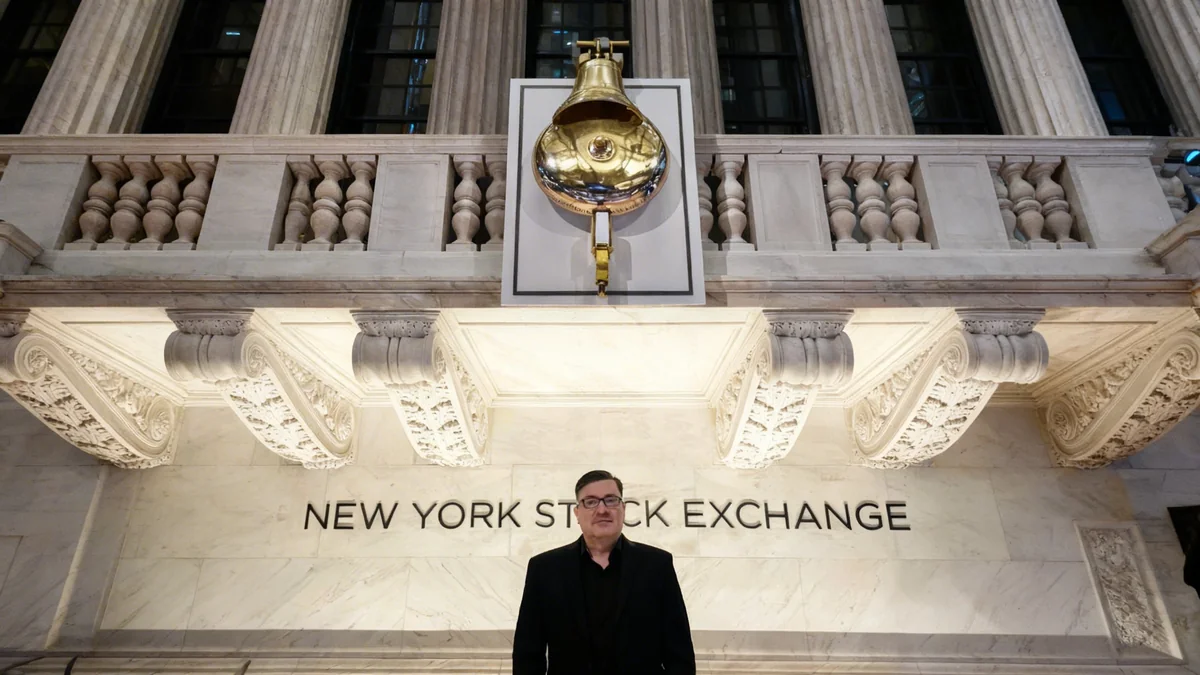Opendoor Technologies has experienced a significant stock price increase of over 525% this year, driven by a combination of factors including a recent Federal Reserve interest rate cut, a change in executive leadership, and heightened interest from retail investors. Despite this momentum, the company has not yet achieved a full year of profitability since its founding in 2014, raising questions about its long-term financial stability.
Key Takeaways
- Opendoor's stock has risen more than 525% year-to-date, largely fueled by retail investor activity.
- Key drivers include the appointment of Kaz Nejatian as the new CEO and a 25-basis-point interest rate cut by the Federal Reserve.
- The company's iBuying business model is highly sensitive to interest rate fluctuations, which directly impact its operational costs and housing market demand.
- Despite a recent quarter of positive EBITDA, management has indicated this trend is not expected to continue due to a weak housing market.
- Analyst consensus remains largely bearish, with an average price target suggesting significant potential downside from current levels.
Interest Rates and Opendoor's Business Model
Opendoor's core business involves purchasing residential properties, making minor renovations, and reselling them for a profit. This model, known as iBuying, is fundamentally linked to the cost of borrowing and the overall health of the housing market.
Changes in interest rates set by the Federal Reserve have a direct and substantial impact on the company's financial performance. Lower rates decrease the cost for Opendoor to finance its home inventory, potentially widening profit margins. They also make mortgages more affordable for consumers, which can stimulate housing demand.
Historical Performance Linked to Rates
During the pandemic, the Federal Reserve's policy of low interest rates created a favorable environment for Opendoor. With U.S. mortgage rates falling to around 3.0%, housing demand surged. This boom allowed Opendoor's revenue to grow from $2.5 billion in 2020 to $15.5 billion in 2022. The company's stock price reached a peak of nearly $35 in February 2021 during this period.
Conversely, when the Federal Reserve began aggressively raising rates in 2022 to combat inflation, the housing market cooled. By mid-2023, the federal funds rate reached 5.5%, leading to higher mortgage costs. This shift caused Opendoor's revenues to fall to an estimated $5.15 billion in 2024, accompanied by significant operating losses that pushed its stock to very low levels.
Recent Catalysts Driving Stock Rally
Despite the challenging market conditions, several recent developments have renewed investor interest in Opendoor, contributing to its dramatic stock price recovery. The rally has lifted the stock more than 830% from its lowest point.
Federal Reserve Policy Shift
On September 17, the Federal Reserve announced a 25-basis-point rate cut, a move that was widely anticipated by the market. This decision was seen as a positive catalyst for Opendoor, signaling a potential easing of borrowing costs and a future revival in the housing market. While the stock price increased ahead of the announcement, the market's enthusiasm was tempered by the Fed's cautious outlook on future cuts and rising concerns about the job market.
Housing Market Lag Time
Historically, the full effects of interest rate cuts on the housing market are not immediate. While affordability improves instantly, it typically takes 3 to 6 months for mortgage applications to increase and 6 to 12 months for home sales and prices to show a significant response.
This delay aligns with warnings from former CEO Carrie Wheeler, who noted in the second-quarter shareholder letter that the latter half of 2025 would likely remain challenging for the housing sector.
New Leadership and Strategic Pivot
A major factor in the renewed optimism is the appointment of Kaz Nejatian as Opendoor's new CEO on September 10. Nejatian previously served as the Chief Operating Officer at Shopify, and his arrival is viewed by investors as a signal of a strategic shift for the company.
The market anticipates that Nejatian will guide Opendoor toward a more capital-light business model. This new strategy is expected to focus on building partnerships with real estate agents and developing recurring revenue streams, moving away from the capital-intensive model of holding large inventories of homes.
"The leadership change and clear direction alone have already revived momentum—especially since the old, capital-intensive model had been weighing on profitability," noted market observers following the announcement.
Financial Health and Market Valuation
While investor sentiment has improved, Opendoor's underlying financial situation remains a key area of focus. The company has a history of unprofitability, and its recent performance highlights the volatility of its business.
In the second quarter, Opendoor reported its first positive EBITDA in three years. However, this was achieved while selling 63% fewer homes compared to the same period last year. Management cautioned investors that this positive EBITDA result was unlikely to be sustained given the ongoing weakness in the housing market.
Valuation Metrics
Investor enthusiasm has caused a significant re-rating of the company's valuation. In mid-August, Opendoor was trading at 3.4 times its price-to-cash flow. That multiple has since expanded to 12.5x, which is now closer to the sector average.
This rapid increase in valuation reflects the high level of speculation surrounding the stock, driven more by future expectations than current fundamentals. The next major test for the company will be its upcoming earnings report in early November, which will provide the first update on its performance under new leadership.
Analyst Outlook and Investment Risks
The consensus among financial analysts covering Opendoor remains cautious, if not bearish. The prevailing view suggests that the stock's current price may not be justified by its financial performance or near-term prospects.
- Analyst Ratings: Out of nine analysts covering the stock in the last three months, five have issued a "Sell" rating, three have a "Hold" rating, and only one recommends a "Buy."
- Price Target: The average 12-month price target for Opendoor stock is $1.44, which implies a potential downside of over 85% from its recent trading levels.
The discrepancy between the stock's market performance and analyst expectations highlights its speculative nature. The current rally is heavily influenced by retail investor sentiment and hype surrounding the new CEO and Fed policy, rather than a proven financial turnaround.
Given the high volatility and uncertain path to profitability, many market experts view Opendoor as a trading vehicle rather than a long-term investment. The options market indicates an expected price move of over 60% around the November earnings release, underscoring the significant risks involved.





